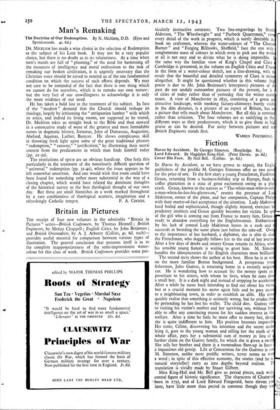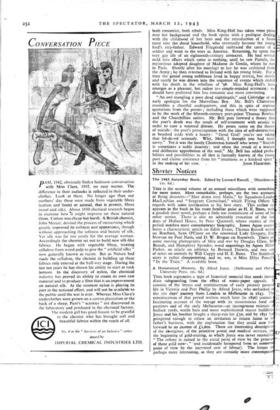Fiction
Havoc by Accident. By Georges Simenon. (Routledge. 8s.) Lord Edward. By Magdalen King-Hall. (Peter Davies. 9s. 6d.) Cover His Face. By Neil Bell. (Collins. 95. 6d.) IN Havoc by Accident, as we have grown to expect, the Engin publishers of the prolific M. Georges Simenon offer us two nove for the price of one. In the first story a young Frenchman, Ferdinan Graux, returning from a business-holiday trip to Europe, finds h coffee plantation in a state of great excitement owing to a pl crash. Graux, known to the natives as "The-white-man-who-is-on! a-man-when-he-has-his-glasses-on," resents the presence of La Makinson, owner of the plane, and her companion, Captain Phel with their matter-of-fact acceptance of the situation. Lady Makins hard boiled and sophisticated, though slightly injured, exercises h predatory instincts and Gram( quickly becomes her victim. In spi of the girl who is coming out from France to marry him, Graux ready to abandon everything for the Englishwoman. Embarrass by his lack of control Lady Makinson leaves in a rush and succeeds in boarding the same plane just before the take-off. Ow. to the importance of her husband, a diploinat, she is able (0 elu the Frenchman, who doggedly follows her to the end of her journ After a few days of doubt and misery Graux returns to Africa, wh his sensible young fiancée is waiting to greet him. M. Simen handles the idiosyncrasies of his English characters most brillian The second story shows the author at his best. Here he is at wo on the more familiar Breton background. A prosperous yo fisherman, Jules Guerec, is returning home in a recently acqu. car. He is wondering how to account for the money spent on prostitute to his sisters with whom he lives, when he runs do a small boy. It is a dark night and instead of stopping he accelerat After a while he turns back intending to find out about his vic but at a crucial moment his nerve again fails and he goes inst to a neighbouring town in order to establish an alibi. His siste quickly realise that something is seriously wrong, but he evades th by pretending he has lost his wallet. The child dies. Guerec tak to visiting his victim's mother and her surviving son, without be. able to offer any convincing reason for his sudden interest in th welfare. After a time he feels he must offer to marry her, thou she is quite indifferent to him. His position becomes impossib His sister, Celine, discovering his intention and the secret und lying it, goes to the young woman and telling her the truth of t whole affair, pays her a substantial sum of money in lieu of further claim on the Guerec family, for which she is given a recei She tells her brother and there is a tremendous flare-up in front a loquacious old gossip. Life at C,oncarneau for the Guirecs is ov M. Simenon, unlike most prolific writers, never seems to wa a word ; in spite of this effective economy, the stories (and he is natural storyteller) carry us into depths beyond realism. translation is vividly made by Stuart Gilbert.
Miss King-Hall and Mr. Bell give us period pieces, each wid: central figure of historic significance. The characters of Chattert '-horn in 5752, and of Lord Edward Fitzgerald, born eleven y later, have little more than period in common though they w both romantics, both rebels. Miss King-Hall has taken some pains over her background and the book opens with a prologue dealing with the childhood of her hero and the introduction of a Scots tutor into the ducal household, who eventually became the young lord's step-father. Edward Fitzgerald embraced the career of a soldier and wan to the wars in America. Returning, he spent the very gay life of an eighteenth-century aristocrat He had several mild love affairs which came to nothing, until he saw Pamela, the mysterious adopted daughter of Madame de Geniis, whom he met in Paris. Shortly after his marriage to her he was cashiered from the Army ; he then returned to Ireland with his young bride. For a time the genial young nobleman lived in happy retreat, but slowly and surely he was drawn into the sequence of events which ended with his death in the rebellion of '98. Miss King-Hall's hero emerges as a pleasant, but rather to, simple-minded aristocrat: we should have preferred him less romantic and more convincing.
"An owl mangling a poor dead nightingale," said Coleridge of an early apologist for the Marvellous Boy. Mr. Bell's Chatterton resembles a cheerful cocksparrow, and this in spite of COPi0113 quotations from the poems ; including those which were supposed to be the work of the fifteenth-century poet-priest Thomas Rowley, and the Churchillian satires. Mr. Bell puts forward a theory that the poet's death was the result of self-treatment with arsenic in order to cure a venereal disease. He pours scorn on the theory of suicide : the poet's preoccupation with the idea of self-destruction is brushed aside with a hearty : "Good God! you're not taking that fol-de-rol seriously. Why, Moll, I thought you had more savvy." Yet it was the lonely Chatterton himself who wrote" Suicide is sometimes a noble insanity: and often the result of a mature and deliberate approbation of the soul" Mr. Bell has added proba- bilities and possibilities to all that is factually known of the young poet and claims assistance from his "intuitions as a kindred spirit"



























 Previous page
Previous page